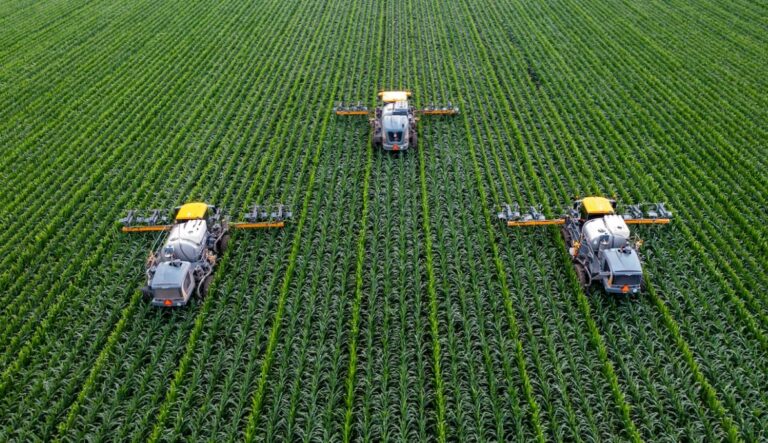Smart Farming signifies a game-changing shift in agriculture through the use of innovative technologies like drones, artificial intelligence, big data, the Internet of Things (IoT), and satellites. These resources not only streamline operations but also boost productivity, thus making farming more cost-effective.
The current global scenario marked by population growth, increased demand for food, and climate change impact amplifies the relevance of smart farming. From precision field monitoring to efficient resource management, these advanced methodologies equip farmers to meet these challenges head-on.
Additionally, the concept of climate-smart agriculture focuses on weather impacts, further optimizing farming decisions. In a nutshell, Smart Farming is the future of sustainable and efficient agriculture.
Table of Contents
Smart farming benefits
The recent surge of technological advancements in the agricultural sector is a game-changer for all, from small farms to large enterprises. This rapid integration of modern farming technologies has democratized its access, reaching developed regions and those in the developmental phase.
Like how digital technology simplifies office tasks, it also revolutionizes work on the farm. Let’s explore the key benefits it offers growers:
- Accelerated data collection and processing: Digital tools speed up the gathering and analysis of crucial farming data, enabling real-time decision-making;
- Improved precision: High-accuracy tools and practices improve precision in sowing, irrigation, and pesticide application tasks;
- Enhanced production efficiency: Advanced systems optimize various farming operations, boosting overall productivity;
- Reduced production costs: By optimizing resource use, it can significantly cut operational costs;
- Decreased manual labor: Automation and robotics reduce the necessity for labor-intensive tasks, alleviating physical strain;
- Increased crop yield: Precision farming and data-driven insights can maximize crop output;
- Minimized driver stress: Autonomous machinery and GPS-guided systems ease the stress on vehicle operators;
- Simplified risk forecasting: Advanced analytics aid in predicting risks like pest infestation or adverse weather, allowing for proactive action;
- Streamlined task recording and reporting: Digital platforms automate documentation, making record keeping and reporting hassle-free;
- Boosted sustainability: It promotes more sustainable and environmentally-friendly practices through efficient use of resources.
Smart farming technologies
Smart farming encompasses an array of advanced tools and technologies aimed at refining agricultural activities. Here are some of the standout tools making a significant difference:
- Machine learning: These self-learning technologies empower farmers with predictive capabilities, allowing them to anticipate changes in climate, soil and water conditions, carbon content, disease spread, and pest invasions;
- Smart farming sensors: These delicate instruments offer real-time monitoring of environmental and field conditions, alerting farmers to even the slightest changes;
- Drones and satellites: These devices enable farmers to create regularly updated maps and remotely monitor their fields, eliminating the need for physical field visits;
- Big data: Big data analytics is integral to accurate forecasting, planning activities, and developing more efficient business models. In the context of smart farming, it allows for strategic long-term decisions and immediate actions;
- Internet of Things (IoT): IoT interconnects all these tools and solutions into a cohesive system. It enables all devices and software to exchange data and perform specific actions based on identified patterns.
These farming technologies offer a significant upgrade over traditional analysis methods. They minimize error probability by accounting for numerous parameters simultaneously, leading to more accurate and reliable farming practices.
IoT smart farming solutions
IoT in smart farming unravels the complexity of managing an extensive network of sensors, drones, applications, and other farming equipment. It facilitates a unified management platform by connecting all these data sources into a single functional system through the Internet and wireless connections. Farmers can now monitor and manage all data and equipment using a single device in real-time without stepping onto the field.
This connected approach boosts overall plant productivity, curtails waste, and optimizes using resources like electricity, fuel, water, and fertilizer. It also allows farmers to choose between manual and automated operations based on sensor data and specific business needs. IoT-based smart farming solutions encompass:
- Smart greenhouses with customized microclimates;
- Remote management of pastures and livestock;
- Territory monitoring with drones;
- Long-term forecasts and financial analytics;
- Precision irrigation;
- Smart pest and disease control;
- Crop and harvest monitoring;
- Weather tracking and prediction in agriculture.
Despite the initial investment, IoT smart farming solutions ultimately prove to be more cost-effective than traditional farming methods, offering comprehensive, real-time control and optimization of farming operations.
The future of smart farming
As we advance further into the digital age, it’s clear that smart farming will play a pivotal role in shaping the future of agriculture. Leveraging advanced technologies such as IoT, machine learning, and big data analytics, it promises to redefine agricultural practices by increasing productivity, enhancing efficiency, and promoting sustainability.
Despite the challenges, the potential benefits far outweigh the hurdles, and efforts are underway to mitigate these issues. From managing climate change impacts to meeting the escalating global food demand, smart farming provides us with innovative solutions.
It represents a remarkable shift in how we approach agriculture – a shift towards a more efficient, sustainable, and technology-driven future. Undoubtedly, the integration of these modern tools and practices will revolutionize the agricultural landscape, making smart farming the new norm in the sector.
Read also: Vertical farming, an innovative method to address food security and sustainability












